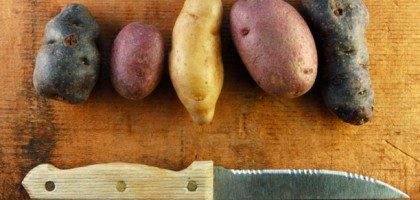Potatoes often retain pesticides even after they are washed and peeled. Almost 80 percent of potatoes contain pesticides. Baby food Babies are the most vulnerable to pesticides, and they eat a lot of this. Milk Dairy cows are routinely fed hormones, antibiotics, and pesticide-covered grains, all of which can end up in your milk. The higher the fat level of the milk, the higher the level of pesticides. And toddlers drink lots of whole milk. PLUS: 12 Affordable Heart-Healthy Foods Apples Apples are near the top of the high-pesticide-level list. They're also a favorite of kids; apples, apple juice, and applesauce are among the most common foods eaten by children ages 1 to 5, according to a USDA survey. So buy organic if you can. Meat Animal feed is often laced with antibiotics and synthetic growth hormones. Residue from these chemicals may still be present in meat. The use of antibiotics in food production could contribute to the rise of antibiotic-resistant bacteria. Nectarines About 97 percent of nectarines have been found to contain pesticides, according to the USDA. Spinach Spinach and lettuce have lots of surface area for pesticides to cover. More than 83 percent of spinach contains pesticides. Peaches and pears Nearly 94 percent of peaches and pears contain pesticides. Peaches are number one on the Environmental Working Group's list of foods with the most and the highest concentration of pesticides. PLUS: 8 Weight Loss Secrets From Around the World Strawberries Thin skins make fruits particularly vulnerable to pesticides. Some 90 percent of strawberries contain pesticides. Bell peppers Peppers absorb pesticides like a sponge. About 68 percent of peppers contain pesticides and many are imported from countries with looser standards than the US has. Eggs Pesticides may pass from chickens to eggs, and from there to the many foods you make with them. Organic eggs come from birds that eat organic feed and are not pumped up with growth hormone or dosed with antibiotics. Imported grapes (from Chile, etc) Some 86 percent of these grapes contain pesticides. And it's pretty hard to peel a grape. Sources: Parents.com, gourmetfood.com, WebMD.com
Potatoes
Labels:
24 hour fitness,
abdominal exercises,
bodybuilding exercise workouts,
diet plan and treadmills,
fitness workouts women and olders,
health care coverage,
health fitness club,
healthy lifestyle
The Most Important Foods to Buy Organic
My Fitness For You
Thursday, September 8, 2011
Subscribe to:
Post Comments (Atom)
Blog Archive
-
▼
2011
(525)
-
▼
September
(144)
-
▼
Sep 08
(10)
- 5 Reasons You're Not Losing Weight
- How to fit in a workout during the day
- Healthy Eating With Him
- 4 Ways to get your legs in shape without exercise
- Want a Satisfaction Guarantee? Plan a C-Section
- Happiest & Saddest Places in the World
- 7 Healthy Must-Reads for the Beach this Summer
- Is Your Birth Control as Safe as You Think?
- The Most Important Foods to Buy Organic
- Improve Your Digestion To Boost Your Mood, Metabol...
-
▼
Sep 08
(10)
-
▼
September
(144)







0 comments:
Post a Comment